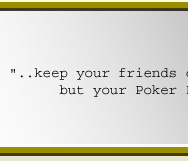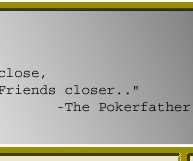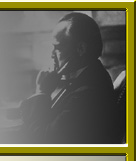Pardon, Your Aces are Showing:
Online Poker Tells - Part 2
In Online Poker
Tells - Part 1 I explained how to become more inscrutable
in cyberspace by eliminating any inadvertent timing tells you
might have. If you've absorbed the lessons of Part 1, you've stopped
using those very convenient but all too "telling" pre-action
buttons. Hopefully, you're also making a conscious effort to take
the same amount of time for each and every online poker action,
since any predictable pattern in your timing gives far too much
information away to savvy opponents.
So far, so good. Eliminating any timing tells of your own is
a big first step. But now it's time to become the hunter rather
than the hunted, to spot your opponents' timing tells and other
online tells and turn them to your advantage.
To get you off to a good start, let's first broaden your knowledge
of the online tell universe. If your awareness of tells has previously
been limited to only those clues picked up from opponent mannerisms
in live physical games, you've been missing a lot of information
unique to internet poker, specifically, that generated by online
tells. Of course, if you haven't played online much, you may have
a question at this point:
What's an online tell?
For online games, we need a definition of an online tell that
goes beyond the physical. I offer the following: An online tell
is an online preference or playing habit indicating a player's
likely hand or how the player may play this or other hands."
By this definition, you don't have to "see" or "hear"
a player in person to spot a tell. You just stay alert for anything
distinctive or habitual in someone's internet play.
For example, if a player habitually uses the "Raise Any
in Turn" pre-action button whenever he has a big hand, and
also uses "Fold/Check in Turn", whenever he has rags,
those are two glaring online tells. If he acts ahead of you, you'll
know to respect his pre-clicked bets and raises by folding all
but your very best hands, but to bet after him with little or
even nothing at all if he auto-checks when you're heads-up.
Sometimes you can even use this strategy against more than one
opponent. If you're in late position and rapid checks from pre-action
buttons ahead of you indicate that nobody has anything, you might
just take the pot with a bet, no matter what cards you hold.
As an exception to my advice against using pre-action buttons,
you might try a well-timed "reverse-tell". To do so,
lie in the weeds with a strong hand by clicking your "Check
in Turn" or "Check/Call Any" button when you're
up front or in middle position. This will give you the perfect
opportunity to check-raise when someone behind you bets. The maneuver
works best when you've noticed an aggressive player in late position
who always bets if rat-a-tat-tat checks have made him believe
nobody else has anything.
Auto-posting tells:
Online poker offers the convenience of auto-posting your blinds
or antes. When players use this feature, the game is considerably
faster. Although you should avoid giving unnecessary information
through the use of the other pre-action buttons, it's considered
rude not to auto-post.
That said, here are a few auto-posting tells:
· Failure to auto-post indicates either an internet newbie
or the opposite - someone savvy who intends to play only a round
or two. Beware of the latter, especially in a pot-limit or no-limit
game: he or she may be looking for just one good hand to make
a quick score.
· A player who has been auto-posting all along but suddenly
stops is usually preparing to leave the game. This is especially
true if he's been winning in a pot-limit game. Beware if such
a player bets or raises, for he's likely to be ultra-cautious
in protecting his profits. If he gets involved, assume he's got
the goods.
· A player who has just stopped auto-posting and is also
otherwise taking too much time to act is not only preparing to
leave but has become quite inattentive to the game. This player
may have just entered a higher limit game or a tournament. If
you find yourself heads-up, aggressive play on your part will
often take the pot.
By Kathleen K. Watterson
(top)
Please Also See:
Poker Tips - Poker
Lessons - Tournament Tips
- Poker Rules
Poker Starting Hands - Estimating
Odds - Poker Strategy
|





